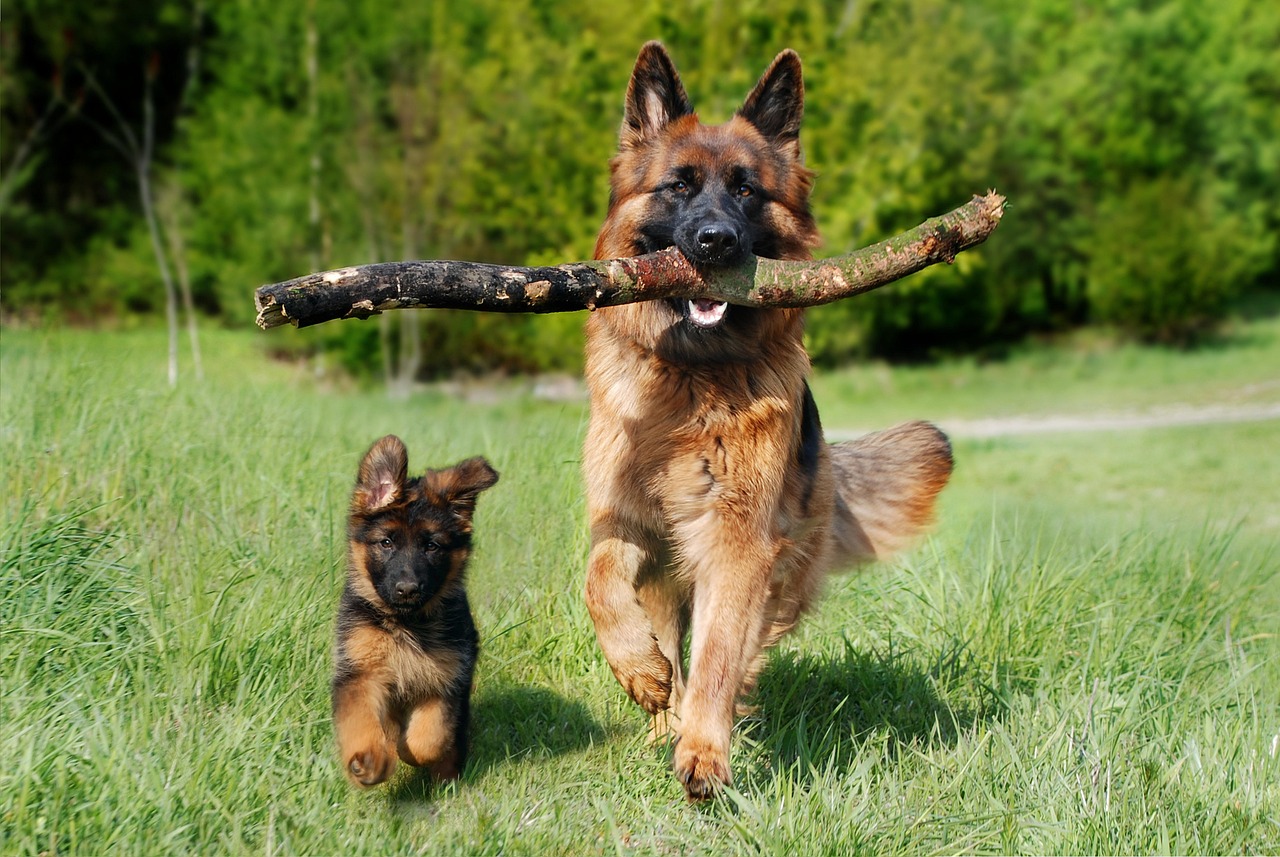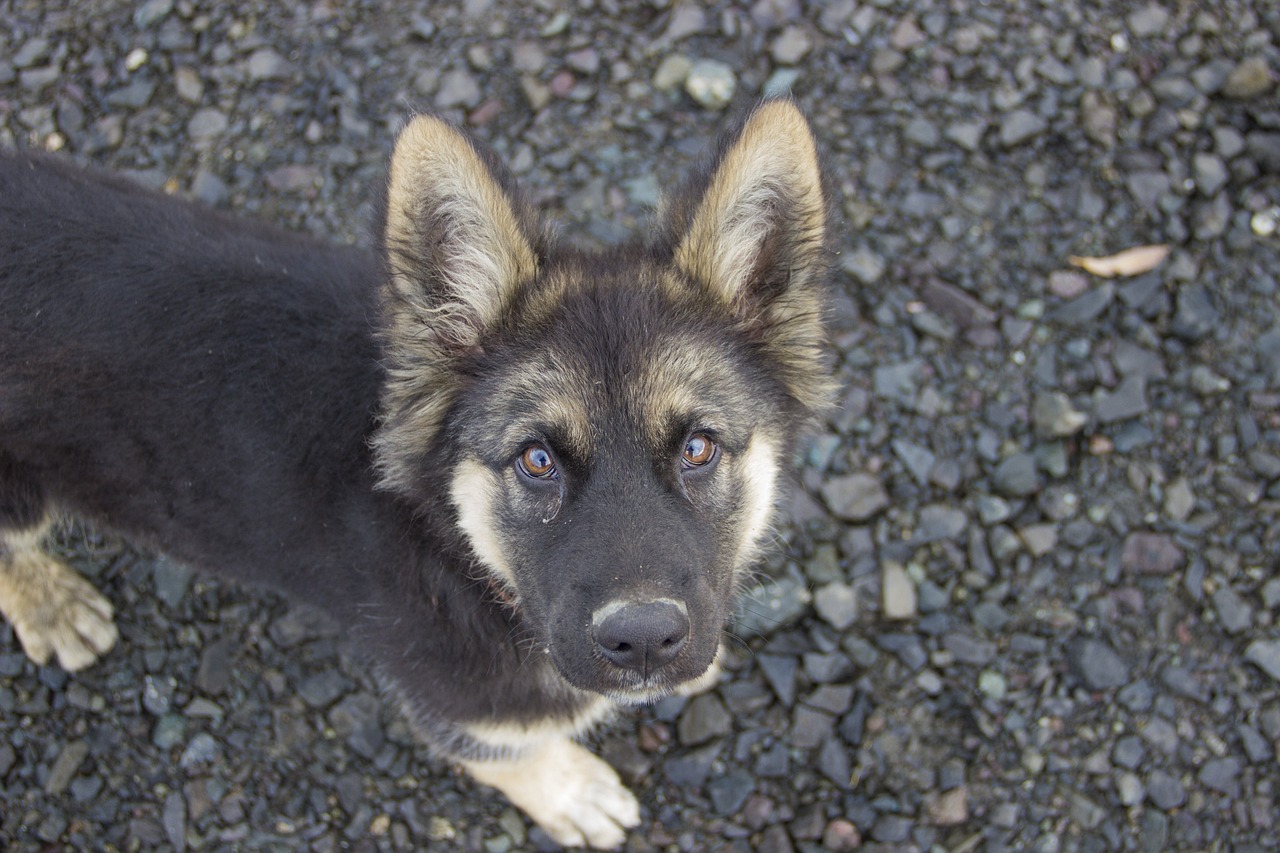German Shepherds are among the most intelligent, loyal, and versatile breeds. They can serve in various roles such as family pets, service dogs, and police dogs. However, the foundation of a well-rounded and confident German Shepherd lies in early and effective socialization. Socialization is the process of exposing your puppy to various environments, people, animals, and experiences to help them grow into a well-adjusted adult. This is especially crucial for breeds like German Shepherds that are naturally protective and can be wary of strangers.
The Right Ways to Socialize a German Shepherd Puppy

Here are the steps to ensure your German Shepherd puppy is correctly socialized:
1. Start Early and Gradually:
The critical period for puppy socialization is between 3-14 weeks, but it doesn’t end there. Start by exposing them to gentle experiences and then gradually introduce them to more complex scenarios as they grow older.
2. Positive Experiences are Key:
Always ensure that your puppy’s interactions are positive. Reward them with treats, praise, or toys when they behave confidently or calmly in new situations. Avoid forcing them into experiences that terrify them.
3. Introduce to Various People:
Let your puppy meet people of different ages, sizes, and ethnicities. This includes children, elderly people, men, women, and people wearing various types of clothing like hats or sunglasses.
4. Encounter Other Animals:
Expose your puppy to other friendly and vaccinated dogs. It’s also beneficial for them to see cats, birds, and other animals they might encounter in their environment. Remember to supervise these interactions closely.
5. Explore Different Environments:
Take your puppy to different places: urban settings, parks, busy streets, quiet neighborhoods, and even places like pet-friendly stores. This will ensure they are comfortable in various environments.
6. Familiarize with Sounds and Surfaces:
Puppies can be startled by the everyday noises we take for granted. Play recordings of thunderstorms, fireworks, sirens, and other loud noises at a low volume and gradually increase the sound level over time. Similarly, let them walk on different surfaces like grass, tile, carpet, and gravel.
7. Handle with Care:
Regularly handle your puppy: touch their paws, ears, tail, and mouth. This will not only prepare them for vet visits but also make grooming easier. Always be gentle and reward them for staying calm.
8. Playtime and Puppy Classes:
Engage in various play activities with your puppy. Games like fetch, hide and seek, and tug can be great for bonding and teaching them to follow rules. Consider enrolling them in a puppy playgroup or class where they can learn and play under professional supervision.
9. Travel in Vehicles:
Take your puppy for short car rides to familiarize them with the sensation. Start with short trips and gradually increase the distance. This will make future vet visits or vacations more manageable.
10. Expose to Everyday Household Activities:
Let your puppy experience common household activities. This includes the sound of a vacuum cleaner, doorbell, washing machine, and even the TV. Familiarizing them with these sounds will prevent anxiety later on.
11. Teach Basic Commands:
Basic commands like “sit,” “stay,” and “come” are essential. They not only instill discipline but also ensure your dog’s safety in various situations.
12. Puppy Obedience Training Program:
Finally, and most importantly, consider starting a puppy obedience training program. This structured training will reinforce the lessons from socialization and ensure your puppy matures into a well-behaved adult. Two highly recommended programs are “SpiritDog’s Ultimate Puppy Training Program” and “K9 Training Institute’s Dog Masterclass.” Both offer comprehensive guidance, ensuring your German Shepherd grows up to be a confident and obedient companion.
The Wrong Ways to Socialize a German Shepherd Puppy

German Shepherds are a breed known for their intelligence, loyalty, and protective instincts. However, improper socialization can lead to a myriad of behavioral issues, ranging from unwarranted aggression to crippling anxiety. Knowing the pitfalls to avoid is just as crucial as understanding the right steps to take. Here are the mistakes you should steer clear of when socializing a German Shepherd puppy:
1. Delaying the Process:
The most impactful period for socializing a German Shepherd puppy is between 3-14 weeks of age. Waiting until the German Shepherd puppy is several months old before starting the socialization process can make it more challenging and less effective.
2. Overwhelming the German Shepherd Puppy:
Introducing too many new experiences at once can be extremely stressful. It’s essential to give the German Shepherd puppy time to process and adjust to one experience before moving on to the next.
3. Forcing Interaction:
Never force a German Shepherd puppy into a situation where they feel trapped or overwhelmed. Pushing them to face their fears can backfire and intensify their anxieties.
4. Neglecting Diversity of Experiences:
If you only expose your German Shepherd puppy to a specific type of environment or group of people, they may develop fears or aggression towards anything outside of that narrow exposure.
5. Ignoring Negative Reactions:
If your German Shepherd puppy shows signs of fear or aggression, it’s essential to address these reactions immediately. Ignoring these signs or hoping they will “grow out of it” is a recipe for long-term behavioral issues.
6. Skipping on Puppy Classes:
Neglecting to enroll your German Shepherd puppy in puppy classes can deprive them of controlled, positive interactions with other dogs and people. These classes offer structured environments where professional trainers can address any budding issues.
7. Avoiding Strangers:
While it’s natural to want to protect your German Shepherd puppy, avoiding strangers altogether can lead to aggression or fear towards unfamiliar people in the future.
8. Using Negative Reinforcement:
Punishing a German Shepherd puppy for showing fear or aggression during socialization can exacerbate the issue. Always use positive reinforcement techniques to encourage desired behaviors.
9. Not Socializing with Other Animals:
Limiting your German Shepherd puppy’s exposure solely to humans is a missed opportunity. They should also be introduced to other dogs, cats, and common household animals to ensure well-rounded socialization.
10. Disregarding Environmental Sounds and Surfaces:
Failure to expose your German Shepherd puppy to various sounds like sirens, thunder, or doorbells can lead to phobias. Similarly, not letting them experience different terrains like tiles, gravel, or sand can make them uncomfortable in unfamiliar settings.
11. Not Setting Boundaries:
While it’s tempting to let a cute German Shepherd puppy get away with everything, it’s essential to establish boundaries early on. Letting them jump on people or chew on furniture without correction can lead to bigger behavioral problems as they grow.
12. Relying Solely on Backyard Socialization:
Keeping your German Shepherd puppy in the backyard and assuming they’re getting adequate socialization is a mistake. They need varied experiences beyond the confines of your home.
13. Avoiding Urban Environments:
If you live in a rural setting, it’s still essential to expose your German Shepherd puppy to urban environments. This ensures they remain calm and composed in different settings, whether it’s a bustling city street or a quiet country lane.
14. Skipping Vet Visits:
Regular vet check-ups are not just for health; they also serve as an opportunity to socialize. Avoiding the vet means your German Shepherd puppy misses out on becoming accustomed to being handled by strangers in a clinical setting.
15. Not Seeking Professional Advice:
Assuming you know everything or that all German Shepherd puppies are the same is a mistake. If you’re unsure about something or if your German Shepherd puppy shows signs of behavioral issues, seeking advice from a professional dog trainer or behaviorist is essential.
Consider Online Dog Training for Your German Shepherd Puppy
Our 2 favorite online courses are:
1. SpiritDog’s “Perfect Obedience” Course
The Perfect Dog Obedience Bundle is an online dog training program designed to help dog owners achieve well-behaved pets. The comprehensive course covers basic obedience, loose leash walking, and includes bonus mini-courses on training habits and rewards, stopping jumping, and separation anxiety solutions. With lifetime access to expert trainers for personalized feedback and a 60-day money-back guarantee, this course aims to provide effective, accessible training for a variety of dog behavior issues.
2. K9 Training Institute’s “Dog Masterclass”
More than just an obedience course, this more comprehensive training course tackles any behavior problem you might face with your dog.
In conclusion, while German Shepherds are undoubtedly one of the most loyal and versatile breeds, they require careful and proper socialization to reach their full potential as companions. Avoiding the above pitfalls is crucial to ensuring your German Shepherd puppy grows into a well-adjusted, confident adult dog.


 Toledo, United States.
Toledo, United States.